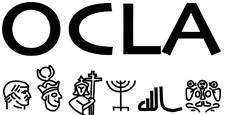Mellon Sawyer Seminar
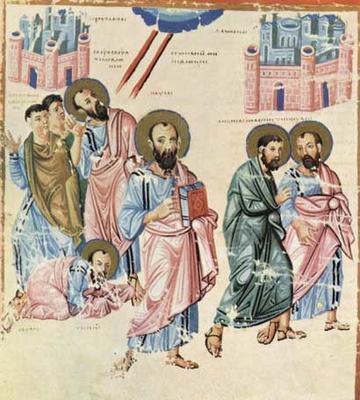
The period between the fourth and the eighth century saw two important movements of conversion, to Christianity at its start, and to Islam at the other end. Their historical significance has been enormous and it would not be overstated to say that they set the religious scene for the Mediterranean to this day.
Despite their importance, these two conversion movements have never been systematically compared to each other. Our aim in this seminar is to create an interdisciplinary forum where this can be done by specialists within a deliberately transversal and comparative framework. The rise of Buddhism in East Asia at roughly the same period has been included in the discussions to avoid remaining within purely Mediterranean models.
Full description of the Mellon Sawyer project on conversion
Averil Cameron’s paper from the Opening Colloquium of the seminar
Paul on the road to Damascus
This Seminar is organised with the generous support of the Andrew W. Mellon Foundation
Opening Colloquium
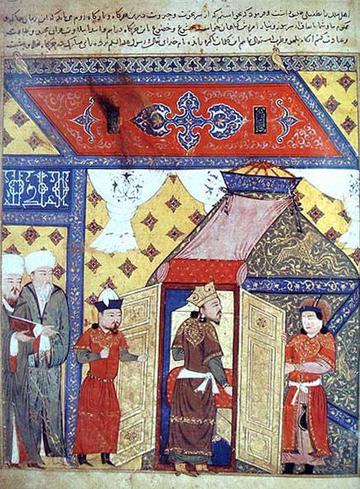
Friday 9 October 2009
- Averil Cameron (University of Oxford):
Late antiquity: A Matter of Size and Shape
CHAIR: Jessica Ehinger (Mellon Scholar) - Walter Scheidel (Stanford University):
State Formation and Belief Systems in Eastern and Western Eurasia
CHAIR: Daniel Schwartz (Mellon Postdoctoral Fellow) - Vesna Wallace ( University of Oxford):
Religious Conversions of the Mongols: Past and Present
CHAIR: Konstantin Klein (Mellon Scholar)
Ghazan Khan converts from Buddhism to Islam
Poster with full details (PDF)
Converting States
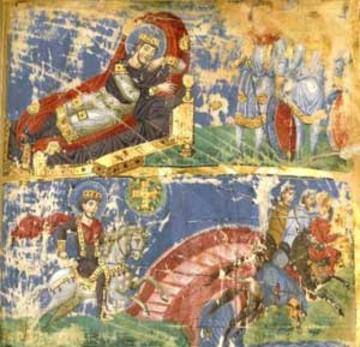
Saturday 16 January 2010
Corpus Christi College, MBI Al Jabert Auditorium
The two processes we are investigating took place within the context of state formation or radical re-orientation. Evidently religious homogeneity, but also distinctiveness from the previous situation, was of primary importance to the states concerned. The aim of this series of sessions will be to analyse the various ways in which the states concerned tackled this problem and the factors that came into play in their choices.
Constantine at the Milvian Bridge
Session 1: East Asia
Chair and discussant: Mark Whittow (Oxford, History)
- Antonello Palumbo (SOAS):
From Constantine the Great to Emperor Wu of the Liang:
The rhetoric of imperial conversion and the divisive emergence of
religious identities in Late Antique Eurasia Abstract
Session 2: Legislation
The Late Roman Empire proceeded by legislation, the Early Islamic Empire by regulations, mirrored in reverse in the canonical collections of the Christian groups that remained within its territory. The two speakers will analyse the relevant sources in order to bring out the underlying motivations and to explore the effect those arsenals of norms produced on the respective conversion processes.
Chair and discussant: Fergus Millar (Oxford, Oriental Studies)
- Uriel Simonsohn (University of Leiden):
Conversion, apostasy, and penance: the shifting identities of the first
generations of Muslim Converts Abstract - Simon Corcoran (University College, London):
From unholy madness to right-mindedness: or how to legislate for
religious conformity from Decius to Justinian Abstract
Session 3: Incentives
Very often, conversion is seen as a way to obtain some material advantage – career has been stressed for Christianity, tax avoidance for Islam. Why was it not the other way round – or was it? Were the two states deliberately using incentives or were the conversions side-effects of other policies?
Chair and discussant: Hugh Kennedy
- Christopher Kelly (University of Cambridge):
Collusion, conformity, coercion: making Christians in late Antiquity - Petra Sijpesteijn (University of Leiden):
The Islamic state as an agent of conversion
Session 4: Propagation
Conversion was also a tool of imperialism and/or foreign policy for the big empires of late antiquity. At first sight, missions and holy war are two different avenues of approach, both practised by both religions at various times. However, holy war can also be a symbolic rather than a literal notion, while ‘peaceful’ missions can result in acute cultural violence.
Chair and discussant: James Howard-Johnston (Corpus Christi College, Oxford)
- Joel Walker (University of Washington):
How Christian was the Late Sasanian Empire?: Patterns of Conversion in the Late Antique Middle East - Michael Bonner (University of Michigan):
“Even if the unbelievers dislike it” (wa-law kariha l-mushrikūn): conversion and the early Islamic
state
Conclusions and discussion
- Richard Bulliet (Columbia University) and Chris Wickham (Oxford, History)
Converting Environments
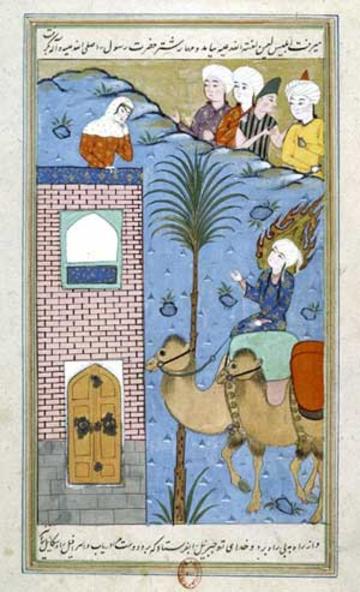
Saturday 24 April 2010
An exciting new avenue of research has been opened in recent years which insists on the common cultural background of Christianity and Islam, and especially on the fact that Islam arose in a world that bore the strong imprint of a very particular form of Near Eastern Christianity. We have chosen to explore three aspects of that environment, focusing on individuals, kinship groups and material culture.
The arrival of Muhammad at Mecca
Session 1: East Asia
Chair and discussant: Charles Ramble (University of Oxford)
Max Deeg (University of Cardiff): “Conversion” to Buddhism in early Medieval China Abstract
Session 2: Facilitators
Lives of holy men and miracle stories all insist on the impact those charismatic individuals had on the religious choices of those who met them. How did rural converters work? What were their focal targets and their methods? Those accounts are all we have, but how to distinguish cultural practices under layers of literary construction? Were Muslim ones modelled on Christian ones? Why or why not?
Chair and discussant: Lesley Abrams (University of Oxford)
Elizabeth Key Fowden (Athens): Landscape and asceticism: the role of the environment in changing religious allegiances Abstract
Thomas Sizgorich (University of California, Irvine): Mind the gap: accidental conversion and the hagiographic imaginary in the first centuries A.H.
Session 3: Families
Families often play an important role in religious change, the most obvious reason being intermarriage – a practice generally rejected by religious leaders eager to keep their flock to themselves. Larger kinship groups and their solidarities or divisions can also be central to the process however. This becomes especially relevant within the logic of tribal affiliation among Arabian populations at the time of Muhammad and the century that followed.
Chair and discussant: Gillian Clark (University of Bristol)
Kate Cooper (University of Manchester): Burning down the house: Anti-family feeling and the household as a space for Christian conversion in late antiquity Abstract
Michael Lecker (Hebrew University): The role of family links in Muhammad’s biography
Session 4: The Holy City
From the very start, political leaders in both traditions focused their attention on Jerusalem, and the marks left by Constantine and ‘Abd al-Malik are still present today. Its lavish buildings are, like miracles, presented as the locus par excellence of the holy, as cultural icons that were signs of God’s grace. How far did the monumental conversion of the Holy City affect that of its population, and that of the empire at large? Did it have the same effect in the fourth and in the seventh century?
Chair and discussant: Bryan Ward-Perkins (University of Oxford)
Jan Willem Drijvers (University of Groningen): From Pagan to Christian? The religious transformation of Jerusalem in the fourth century Abstract
Robert Schick (American Center for Oriental Reserach in Amman, Jordan): A Christian city with a major Muslim shrine: Jerusalem in the Umayyad period Abstract
Conclusions and discussion
Nicholas Purcell (University of Oxford)
All are most welcome to attend but please register for the colloquium with Jess Ehinger. There is no charge to attend the colloquium; however, a sandwich lunch will be available on site for ₤5. If you would like to take part in the lunch please indicate this no later than Friday 16 April.
Converting Identities
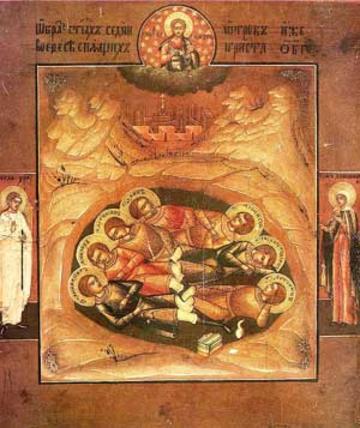
Friday 2 July 2010
The most potent image of conversion today is still the one informed by the paradigm of Paul on the way to Damascus: the complete and often sudden conversion of an individual, who will after this important moment change not only his beliefs but his ways, his cultural references, even his name – indeed, will take up a new identity. This was held up as a norm by religious leaders, although it simply could not correspond to reality. Besides, individual identity was not the only self-referential form that was at stake in conversion. What were the others? Was the change always seen as positive? How did the relationship between the individual and his cultural milieu work in such cases?
The Seven Sleepers
Session 1: East Asia
Chair and discussant: Catherine Holmes (Oxford, History)
Charles Ramble (Oxford, Oriental Institute):
“What lies beneath: the need for a half-done job in Tibetan Buddhist narratives of conversion
Session 2: The Stakes of Resistance
Martyrdom has been constructed into the glorious fight till death for one’s religion. It presupposes a form of persecution, or at least pressure to convert to an official creed. Beyond the triumphalist accounts, we would like to investigate the stakes of such resistance – and also of such pressure. The Christians, who first resisted it, then exerted it on others. Did the Muslim tradition draw on such accounts and in what way? Why was there no direct pressure from the state to convert? How did the Islamic principle of punishing apostasy by death influence the conversion processes?
Chair and discussant: Conrad Leyser (Oxford, History)
Samuel N. C. Lieu (Macquarrie University, Sydney and SOAS)
“The diffusion, persecution and transformation of Manichaeism in Late Antiquity and pre-Modern China” Abstract
André Binggeli (IRHT, CNRS, Paris):
“Neo-martyrs and the attitude of the Church to martyrdom in early Islamic Syria” Abstract
Session 3: Languages
Language is one of the most obvious markers of ethnic and cultural identity. Christianity followed the ‘Pentecost’ principle of translating its message into the necessary languages; Islam required all adherents to adopt the sacred language. How did this opposition function in the context of conversion? Did it suppose a different mode of identity-building? How was this perceived and negotiated by the converts and converters?
Chair and discussant: Simon Swain (University of Warwick)
Philip Rousseau (Catholic University of America):
“Articulating the convert's goal in the sixth-century west: Psychological and social vocabulary” Abstract
Session 4: Personae
There are some famous individual accounts of conversion, such as the much-studied Augustine. We would here like to take examples that are less well-known and to explore the more intimate aspects of conversion as they have been described. What is the literary and historical background of such accounts? How far do they influence the degree of fictionalisation of the conversion process itself? Is their cultural function similar in both cases?
Chair and discussant: Tim Whitmarsh (Oxford, Classics)
Polymnia Athanassiadi (University of Athens):
“Christians and others: the conversion ethos of Late Antiquity" Abstract
Julia Bray (Université Paris 8 – St Denis):
“Arabic literature and the human personality” Abstract
Conclusions and discussion
Guy Stroumsa (Oxford, Theology)
Attendance is free, but those wishing to attend should register with Konstantin Klein.
Converting Practice
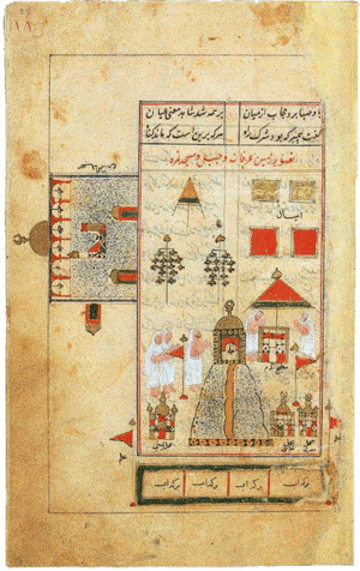
Saturday 3 July 2010
Conversion to a new religion surely meant very different things to different converts. However, in the case of Christianity, scholars have generally emphasized cognitive models of conversion. These models tend to assume the inherent superiority of monotheism vis-à-vis pagan polytheism and see conversion to Christianity as a well-reasoned and heart-felt decision. Alternately, conquest and coercion often dominate the discussion of conversion to Islam. In neither case have scholars given sufficient attention to one of the most basic components of conversion, the changes in religious practice which conversion entailed. For many converts, such changes would have played a large role in shaping their perception of the new religion both before and after conversion.
The significance of religious practice for conversion takes many forms. Rites of initiation served to incorporated converts to the new religion but also drew a line between insiders and outsiders. Such lines functioned both to exclude outsiders and attract converts. For those who converted, rituals of initiation were often used as powerful pedagogical moments designed to teach the priorities of the new community. However, rituals were not always controlled by religious elites and we find many examples of members of a religious community engaging in ritual activity which they have appropriated in personal ways, effectively defining their religious practice in somewhat autonomous ways.
Description: folio 29 recto: the plain of Arafat, with the mountain and mosque of Numreh.
Image Copyrights: Image © The Metropolitan Museum of Art
Session 1
Chair and discussant: Yannis Papadogiannakis (University of Oxford)
Konstantin Klein (University of Oxford):
“ 'When religion became serious': The Arabs on their way to monotheism” Abstract
David Frankfurter (University of New Hampshire):
“Shrine gestures and syncretism in Late Antique Christianity” Abstract
Session 2
Chair and discussant: Jessica ehinger (University of Oxford)
Moshe Lavee (University of Haifa):
“A Matter of Court: The Babylonian Talmud and the establishment of Jewish conversion procedure” Abstract
Nancy Khalek (Brown University):
“Conversion to Islam during the lifetime of Muhammad” Abstract
Attendance is free, but those wishing to attend should register with Konstantin Klein

